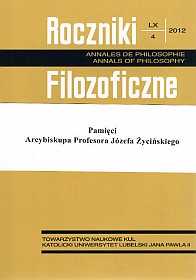Moderately Pluralistic Methodology
Abstrakt
Artykuł prezentuje i omawia zasadnicze założenia koncepcji umiarkowanie pluralistycznej metodologii. Ta ostatnia jest zbieżna z J. Życińskiego zasadą naturalności interdyscyplinarnej. Reprezenuje ona szeroko rozumiany nurt pluralizmu naukowego w zakresie sposobu prowadzenia badań w danej dziedzinie. W tej koncepcji połączone są dwa poziomy rozumienia symboliczny i przyczynowy za pomocą swoistego rodzaju wnioskowań kontrfaktycznych, określonych tu jako rozgraniczających wnioskowań kontrfaktycznych. Dzięki nim umiarkowanie pluralistyczna metodologia ma zastosowanie do badań nieeksperymentalnych.
Bibliografia
Ahmed A., Sil R., (2012), “When multi-method research subverts methodological pluralism – or, why we still need single-method research”, Perspectives on Politics, w druku, ss. 40.
Barker C., Pistrang N., (2005), “Quality criteria under methodological pluralism: implications for conducting and evaluating research”, American Journal of Community Psychology 35: 201-212.
Bohman J., (2009), “Pluralism, pragmatism and self-knowledge”, Human Studies 32:375–381.
Carnap R., (1928/1967), the logical structure of the world, tłum. R. George, Chicago.
Cartwright N., (2007), “ Counterfactuals in Economics: A Commentary“, in: J. K. Campbell, M. O’Rourke, H. Silverstein (eds.), Causation and explanation, Cambridge, MA.: The MIT Press, p. 191-216.
Collins J., Hall N., Paul L. A., (2004), “Counterfactuals and Causation: History, Problems, and Prospects”, in: Causation and counterfactuals, Cambridge, MA.: The MIT Press, p. 1-57.
della Porta D., Keating M., (2008), Approaches and methodologies in the social sciences: A pluralist perspective, Cambridge: Cambridge University Press.
Gould J. E., (2002), Concise Handbook of Experimental Methods for the Behavioral and Biological Sciences, London: CRC Press.
Heidelberger M., (2011), “Causal and symbolic understanding in historical epistemology“, Erkenntnis 75: 467–482.
Heller M., Życiński J. (1996), Dylematy ewolucji, Tarnów: Biblos.
Jaffe A., Quinn F., (1993), “Theoretical mathematics: Toward a cultural synthesis of mathematics and theoretical physics“, Bulletin of the American Mathematical Society 29: 1-13.
Kawalec P., (2006), Przyczyna i wyjaśnianie, Lublin: Wydawnictwo KUL.
Kawalec P., (2011), Wstęp, in: Carnap R., Logiczna struktura świata, tłum. P. Kawalec, Warszawa: Wydawnictwo Naukowe PWN, s. XI-CXXV.
Kellert S. H., Longino E.,Waters C. K. (red.), (2006), Scientific pluralism, Minneapolis: University of Minnesota Press.
Knox K., (2004), “A researchers’ dilemma: philosophical and methodological pluralism“, Electronic Journal of Business Research Methods 2: 119-128.
Morgan S. L., Winship C., (2007), Counterfactuals and causal inference: methods and principles for social research, Cambridge: Cambridge University Press.
Rickert H., (1929), Die Grenzen der naturwissenschaftlichen Begriffsbildung. Eine logische Einleitung in die historischen Wissenschaften, Tübingen.
Sankey H., (2000), “Methodological pluralism, normative naturalism and the realist aim of science“, w: R. Nola & H. Sankey (red.), After Popper, Kuhn and Feyerabend: Recent issues in theories of scientific method, Dordrecht: Kluwer Academic Publishers, p. 211-229.
Suppes P., (1978), “The plurality of science“, PSA: Proceedings of the Biennial Meeting of the Philosophy of Science Association, vol. 2, Symposia and Invited Papers, p. 3-16.
Życiński J., (1996), Elementy filozofii nauki, Tarnów: Biblos.
Życiński J., (2006), “The rationality field and the laws of nature“, in: S. Wszołek, R. Janusz (eds.), Wyzwania racjonalności, Kraków: OBI-WAM, p. 87-101.
Życiński J., (2009), “Nauki przyrodnicze i myśl chrześcijańska w komplementarnym dążeniu do prawdy”, in: P. Kawalec, P. Lipski (eds.), Kadry i infrastruktura nowoczesnej nauki: teoria i praktyka, Lublin: Wydawnictwo LBS, s. 19-26.
Życiński J., (2011), Świat matematyki i jej materialnych cieni, Kraków: Copernicus Center Press.
Copyright (c) 2012 Roczniki Filozoficzne

Utwór dostępny jest na licencji Creative Commons Uznanie autorstwa – Użycie niekomercyjne – Bez utworów zależnych 4.0 Międzynarodowe.





